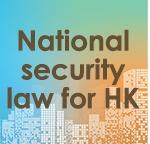The Hong Kong Special Administrative Region government on Sunday lashed out at the “slandering remarks” made by the foreign ministers of Australia, Canada, and the United Kingdom, and the United States Secretary of State after 55 opposition activists were arrested last week on suspicion of subversion under the National Security Law for Hong Kong.
The spokesman, in a statement, said the government was appalled by “remarks made by some overseas government officials that seemed to suggest that people with certain political beliefs should be immune to legal sanctions”.
Hong Kong prides itself on the rule of law; law enforcement agencies are duty-bound to take action against unlawful acts, regardless of the political background of the suspects. Arrests made are based on evidence and strictly in accordance with relevant laws and regulations
spokesman for the Hong Kong Special Administrative Region government
The statement was in response to comments made by the four politicians after the arrests of those tied to a self-organized ballot as part of a long-term plan to paralyze the government.
A joint statement issued earlier on Sunday by Australian Foreign Minister Marise Payne on behalf of the foreign ministers said, “It is clear that the national security law is being used to eliminate dissent and opposing political views. We call on the Hong Kong and Chinese central authorities to respect the legally guaranteed rights and freedoms of the people of Hong Kong without fear of arrest and detention.”
“The Hong Kong government spokesman said, “The National Security Law, or indeed any law in the HKSAR, applies equally to every person in Hong Kong; no one is above the law.”
“Hong Kong prides itself on the rule of law; law enforcement agencies are duty-bound to take action against unlawful acts, regardless of the political background of the suspects. Arrests made are based on evidence and strictly in accordance with relevant laws and regulations.”
READ MORE: HKSAR govt refutes statement by foreign officials on arrests
Taking people who have contravened the law to justice is the duty of every government, and where the offence concerns national security, the interests of the country and every citizen are at stake. This national obligation should be fully respected in the international arena,” the spokesman added.
In fact, the spokesman noted that the National Security Law is “on par with” similar national security laws in other jurisdictions.
Thus, it is “clearly double standards” to make those “slandering remarks” about the National Security Law, the spokesman said.
A spokesman for the Office of the Commissioner of the Ministry of Foreign Affairs in the Hong Kong Special Administrative Region pointed out that repeated vicious attacks against Hong Kong’s National Security Law by some Western politicians were a typical case of “double standards”.
Their action has substantiated the power of law in closing loopholes for internal and external forces to undermine Hong Kong’s stability and development, he said.
The Office firmly supports the HKSAR government in its law-based governance and the police force in their strict law enforcement, so as to promote the steady development of “one country, two systems” under the protection of the National Security Law, the spokesman said.
The spokesman urged these Western politicians to have a clear understanding of history and reality, abide by international law and the basic norms of international relations, and immediately stop interfering in China’s internal affairs.
ALSO READ: Ex-magistrate: Arrests won’t hurt democracy
Commenting on the biggest crackdown yet under the security law six months into its enactment, political scientist Lau Siu-kai believes the police acted after they had collected extensive evidence and studied the laws thoroughly.
Lau, vice-chairman of the Chinese Association of Hong Kong and Macao Studies, said the deterrent move is a symbolic action that helps safeguard the authority of the National Security Law.
The central government and the SAR government had warned the activists that holding such unofficial ballots may contravene the security law, Lau noted.
If the activists’ actions went unchecked, it would render the security law a mere formality, he said.



